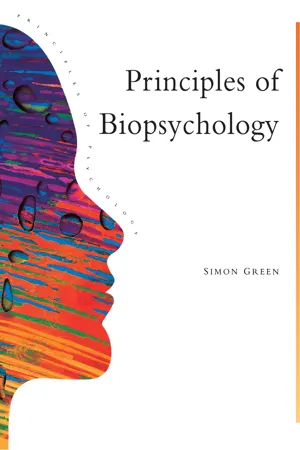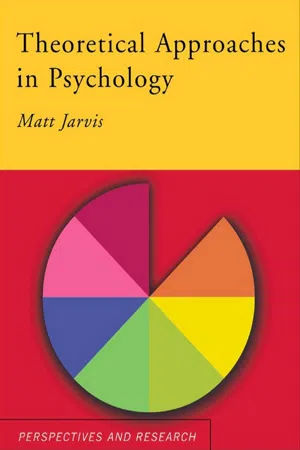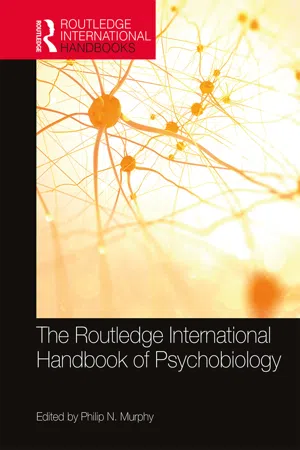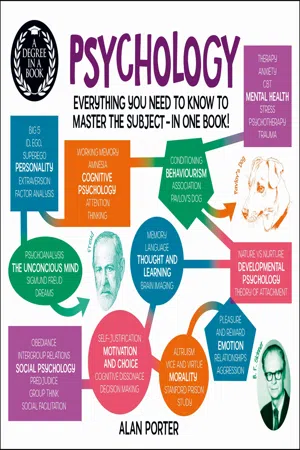Biopsychology
Biopsychology, also known as behavioral neuroscience, is the study of how biological processes influence behavior and mental processes. It explores the relationship between the brain, nervous system, and behavior, examining topics such as genetics, hormones, and brain structure and function. By understanding the biological underpinnings of behavior, biopsychologists contribute to our understanding of psychological phenomena.
7 Key excerpts on "Biopsychology"
- eBook - ePub
- Simon Greene(Author)
- 2013(Publication Date)
- Psychology Press(Publisher)
...1 What is Biopsychology? T he term Biopsychology is just one of many names given to that area of science which studies the relationship between biology and behaviour. Others include psychobiology, biological psychology, and physiological psychology. Biology refers to all the physiological systems we find find in the body— muscles, the blood supply, glands, the nervous system etc. In practice, the study of biology and behaviour concentrates on the brain and the nervous system, although we will be covering the role of glands and hormones in, for instance, emotion and stress. Researchers from many backgrounds work in Biopsychology. They may be neurologists, neurophysiologists, neuroanatomists, pharmacologists, biochemists, or psychologists. Although psychologists cannot usually compete on a specialist level with, for instance, a biochemist interested in the synapse, psychology plays a vital role in the study of brain and behaviour. The biochemist or neuroanatomist often assumes that brain structure and biochemistry are complicated, whereas behaviour is simple. The psychologist, on the other hand, knows that even apparently simple behaviour, such as the rat exploring a maze or a human falling asleep, is in fact as complicated as the underlying physiology. So a complete description and explanation of the links between brain and behaviour involves an analysis of behaviour by psychologists that is just as sophisticated as the analysis of brain structure and biochemistry. The biopsychologist therefore has to become familiar with the terminology and findings from the basic brain sciences mentioned earlier. This has led to the accusation by other psychologists that biopsychologists support a reductionist approach to the explanation of behaviour. Reductionism Psychology is the scientific study of behaviour. It can range from the study of large crowds, through the dynamics of small group interactions, to the study of the individual...
- Nancy Fenton, Jessica Flitter(Authors)
- 2015(Publication Date)
- Research & Education Association(Publisher)
...Chapter 5 Biological Bases of Behavior Biological psychology can be traced to the beginnings of psychology because it has its roots in physiology. The field of biological psychology, also called neuroscience, focuses on how genes, the nervous system, and the endocrine system influence behaviors and mental processes. Technological advances have allowed biological psychologists to provide a more complete understanding of what occurs on a physiological level during a psychological experience such as thinking or memory. Heredity, Environment, and Evolution An important aspect of the study of psychology is the interplay among genetic, environmental, and evolutionary influences. Complex human traits, such as intelligence, aggression, altruism, and personality, are influenced by all of these factors. For instance, psychologists attempt to determine how an individual’s level of aggression is impacted by inheritance and exposure to violence, as well as why aggressive tendencies were naturally selected. Biologists and psychologists are both interested in the various influences of nature and nurture on human traits. Biologists study physical traits, such as height and eye color, or susceptibility to diseases, such as cancer. In contrast, psychologists are interested in behavioral traits and psychological illnesses. Behavioral traits include aggression, intelligence, personality, etc.; psychological illnesses include anxiety, schizophrenia, depression, etc. The scientific discipline of behavioral genetics attempts to integrate the influences of heredity, environment, and evolution in terms of their effect on human behavior. Heredity Biological psychologists are interested in the study of heredity, or how the traits of parents are transmitted biologically to offspring. The nucleus of each human cell contains forty-six chromosomes, twenty-three donated by each parent. Chromosomes that determine gender are known as the X and Y chromosomes...
- eBook - ePub
- G Neil Martin(Author)
- 2015(Publication Date)
- Routledge(Publisher)
...There are some terms used to describe specific types of biological psychology (and, therefore, biological psychologist) and there are other terms that are synonymous with it. Some of the terms that are interchangeable with biological psychology include psychobiology and physiological psychology – to all intents and purposes, all of these terms refer to the same discipline. Other terms that refer to specific areas of biological psychology include neuroscience, neuropsychology, histology and psychoneuroimmunology. Neuroscience Neuroscience is an area of study where psychology, physics, chemistry and biology converge. It refers to the study of the neural basis of behaviour, and much of the work in the area is cellular in nature. Neuroscientists are interested in how specific brain cells, types of brain cell or groups of brain cells contribute to brain function and to behaviour. For example, neuroscientists may be interested in discovering whether specific types of cell are involved in specific behaviours (such as object or face recognition); they might be interested in discovering which chemical systems in the brain become active or inactive during certain psychological states such as sleep, mental impairment, depression, schizophrenia, and so on. It is sometimes prefaced by 'cognitive' to indicate that the study involves the neural basis of aspects of cognition such as using language, recognising objects, places and faces, recognising and experiencing emotion, performing mental arithmetic tasks, engaging in visual imagery, and so on (Posner and DiGirolamo, 2000). Some psychologists combine what seem on the surface to be entirely different branches of the discipline, such as neuroscience and social psychology...
- eBook - ePub
- Matt Jarvis(Author)
- 2005(Publication Date)
- Routledge(Publisher)
...they reduce complex psychological phenomena to simple biological processes. This can have negative consequences. In the example given above, for example, whilst old paint might be one contributing factor in the relationship between poverty and intellectual development it certainly isn’t the only factor or even the most important one. We could not remove the impact of poverty just by repainting all old properties, and it is dangerous and misleading to suggest that we could. There will always be some aspects of psychology that cannot be explained by adopting a physiological approach. For example, we might know that people suffering from depression typically have lowered levels of serotonin, and that we can correct this with drugs. However, this does not tell us why people who lost a parent in early childhood are more likely to suffer depression as an adult. That requires another level of explanation that can be provided by one of the other theoretical approaches. Summary Biological approaches to psychology use three key ideas from biology, genetics, evolution and physiology to understand psychology. Behavioural genetics is the study of the heritability of psychological characteristics. Genes have been implicated in a number of psychological variables, including intelligence and some mental disorders. Evolutionary psychologists have suggested that many of our characteristics and abilities have developed through a process of evolution because they are useful to us in some way. Neurophysiology focuses on the structure and function of the brain and nervous system and the ways in which these contribute to psychological functioning. New scanning techniques have allowed us to gain an increasing knowledge of brain function. One area of study in neurophysiology concerns bodily rhythms. Our knowledge of circadian rhythms has allowed us to understand the effects of jet lag and shiftwork. An understanding of ultradian rhythms has enriched our knowledge of sleep and dreaming...
- eBook - ePub
- (Author)
- 2012(Publication Date)
- Wiley(Publisher)
...Chapter 3 Biological Psychology Robert E. Clark, Jena B. Hales, Stuart M. Zola, and Richard F. Thompson The Mind The Brain Sensory Processes Learning and Memory Motivation and Emotion Cognitive Neuroscience Conclusion References The great questions of philosophy, the mind–body problem and the nature of knowledge, were also the questions that drove early developments in the pathways to modern psychology. This is especially true of biological or physiological psychology. Wilhelm Wundt, who founded experimental psychology, titled his major work Foundations of Physiological Psychology (1874/1908). William James, the other major figure in the development of modern psychology, devoted a third of his influential text Principles of Psychology (1890) to the brain and nervous system. Both Wundt and James studied medicine and philosophy, and both considered themselves physiologists. Their goal was not to reduce psychology to physiology but rather to apply the scientific methods of physiology to the study of the mind. The other driving force in early biological psychology was the study of the brain and nervous system. The major topics in modern biological psychology are sensory processes, learning and memory, motivation and emotion, and, most recently, cognition—in short, behavioral and cognitive neuroscience. A number of other areas began as part of physiological psychology and have spun off to become fields in their own right. We treat the major topics in biological psychology separately in the text that follows. But first we sketch very briefly the recent philosophical and physiological roots. The Mind The history of such issues as the mind–body problem and epistemology is properly the domain of philosophy, treated extensively in many volumes and well beyond the scope of this chapter and the expertise of these authors...
- Philip N. Murphy, Philip N. Murphy(Authors)
- 2018(Publication Date)
- Routledge(Publisher)
...In order to avoid any confusion with the term ‘correlation’ as a statistical method of analysis, it may be more appropriate to talk of the co-occurrences of changes in the nature or activity level of biological processes, on the one hand, and psychological phenomena, on the other. The human nervous system, incorporating the brain, functions by means of processes that are essentially biological in nature, with the processes around neurotransmission and the communication between the nervous system and other systems and structures within the body, such as the endocrine system and musculature, being of particular importance. As a general statement, it is the co-occurrences of these biological processes and psychological phenomena that psychobiologists predominantly study. As the biological processes in question generally concern the nervous system in some way, the term ‘neurobiological’ may sometimes be used in relation to such processes. p.2 Research into the co-occurrences of biological processes and psychological and behavioural phenomena may adopt different perspectives. Firstly, a biological process may be studied with regard to subsequent changes in the likelihood of, or the performance level for, a particular psychological outcome. Chapter 12, for example, reviews the evidence for relationships between the bioavailability of certain essential oils and aromas following ingestion, inhalation, or dermal absorption (as appropriate to the substance), and consequent changes in cognitive and affective functioning. Alternatively, Chapter 28 reviews the evidence for putative biological foundations to personality, such as the influence of polymorphic variation in genes upon the activity of monoaminergic pathways to influence, in turn, the occurrence of certain personality features and related behaviours...
- eBook - ePub
A Degree in a Book: Psychology
Everything You Need to Know to Master the Subject - in One Book!
- Alan Porter(Author)
- 2018(Publication Date)
- Arcturus(Publisher)
...Chapter Four Biological Psychology Brain and Nervous System – Early Ideas – Cerebrum and Cortex – Localisation of Brain Function – Faculties and Phrenology – Nerve Impulses – Electrical Activity of Cortex – Ablation and Clinical Method – Non-invasive Techniques – Other Approaches Brain and Nervous System For the learning theorists we met in Chapter 2, the working of the brain and nervous system is very interesting and definitely worthy of study in its own right, but it is a branch of physiology – not psychology proper. Some psychologists believe that theories in psychology can be studied without reference to the brain and nervous system, just as, say, it is possible to study art without a thorough understanding of chemistry. It might be useful to know about the chemistry of artists’ paint but not essential to understand art. However, for most psychologists, some knowledge of the brain and nervous system is useful, given the intimate connection between mind and brain that we now take for granted. COGNITIVE NEUROSCIENCE ► combines research on the anatomy of the brain with experimental psychology. Cognitive neuroscientists believe that it is essential to understand the brain and nervous system and argue that a fully developed cognitive neuroscience will integrate research from experimental psychology with research on brain anatomy and the organisation of the nervous system to give us a complete picture of human psychology. In this chapter we review how our understanding of the brain and nervous system has developed over the last thousand or so years and describe some of the new and powerful techniques that are allowing us to understand more clearly the relationship between mind and brain. Gustav Fechner used himself as a test subject to learn more about perceptual judgements. Gustav Fechner (1801–1887) is known as the father of psychophysics (the investigation of the relationship between physical stimuli and our psychological judgements of those physical stimuli)...






